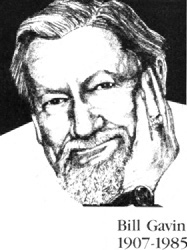 From the MCRFB NEWS archive: 1964
From the MCRFB NEWS archive: 1964
The Bill Gavin Newsletter (January 11, 1964)
From the Desk of Bill Gavin Billboard Contributing Editor
I T I S A M A Z I N G H O W M A N Y young men want to be disk jockeys. It must be that with his record dance hops, his regular air shows, his apparent closeness to record stars and his obvious importance to so many people, the disk jockey appears as a glamorous person. His profession seems surrounded by all the magic glitter of show business. Unfortunately for the ambitions of the young hopefuls, the real contents of the package are not nearly as attractive as the shiny wrapping that enclose it. Being a disk jockey is not nearly as rewarding as so many seem to think.
 As a group, disk jockeys are not highly paid. On the average they do not receive as much as truck drivers, machinists, or brick layers. The highly paid luminaries in a few large cities are the exceptions. It is as hard to break into their select circle as it is to make the major leagues in baseball.
As a group, disk jockeys are not highly paid. On the average they do not receive as much as truck drivers, machinists, or brick layers. The highly paid luminaries in a few large cities are the exceptions. It is as hard to break into their select circle as it is to make the major leagues in baseball.
Life in Smaller Stations
Most disk jockeys work in smaller towns. They lack any union protection of wages or working conditions. It is not uncommon to find them running errands, cleaning floors, selling time, repairing equipment, writing spots and so on, with no extra pay for extra work. They are not wooed by record companies; they don’t have artists begging to appear at their hops. They don’t even receive many of the important hit records. If they insist on playing certain records, they have to buy them at the store.
T H E S M A L L T O W N D I S K J O C K E Y has only one hope to keep him at his unrewarding job; he might some day land a job in the Big Town. Most, of course, do not. The turnover rate for small-station disk jockeys is very high.
There are a few who make the grade and hit the big time. They have it made now, they think. But they don’t. They learn, first of all, that they live and die “by the numbers.” The listener surveys show each month what percentage of the
audience is tuned in to their show. Let their share drop below the station average and they are finished, no matter how much the boss may like them and their work. They learn to live with insecurity.
The professional disk jockey, even with proved ability, has to take his work where he finds it. If he needs a new job. he must go where the job is. It may he in Minneapolis or Dallas or Cincinnati. Job openings are few, and so he packs up his family and moves. Generally speaking, disk jockeys are among the nation’s most rootless professionals.
T H E D I S K J O C K E Y W H O H A S just come up from the minor leagues of radio into the big city job is often surprised to learn that his salary isn’t as large as he had expected. If he wants to increase his earnings, he has to make it on the outside
with record hops. In this field he usually finds himself in fierce competition with other disk jockeys for any available “live” talent. He may begin evaluating records. not in terms of their merit, but with reference to how co-operative the
promoters or distributors have been in providing his hops with artists. He may even reach a point where his boss considers his behavior unethical
and inimical to the station’s standing with the FCC. That means trouble.
Music Control Gone
The would-be disk jockey’ has visions of playing his favorite records on the air, chosen from thousands available in the record library. How wrong he is. Record programs on almost every pop station are made up from a list of less than 120 titles. The deejay has little or nothing to do with making up that list. He must make up his shows with a majority of selections from the top 30 or 40 on the list. His own preferences have little to do with the case. He learns to “sell” the music he plays as effectively as he sells the sponsors’ products, though he may have as little personal fondness for the one as for the other.
H E I S S U P P O S E T O B E A “personality” but he must also conform to the station’s “sound.” He is urged to be creative and to use his imagination, but the boundaries within which he can operate are rigidly prescribed and extremely narrow. A disk jockey on a formula station needs to work hard to find a continuing challenge in his work. Being a disk jockey is not without its rewards. Those who seek such a career should do so realistically and not as glamour seekers or status chasers. END
___
(Information and news source: Billboard; January 11, 1964)
![]()
